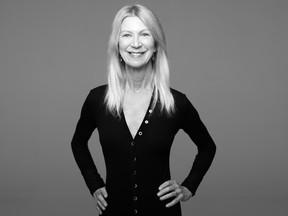To be a female-friendly advisor, make the ‘G’ in ESG stand for gender
Women want to invest in causes that matter, and a sustainable and fair future is No. 1, writes researcher Barbara Stewart

Article content
Fourth in a series on how global finance culture is changing as financial institutions realize that wealthy women represent a lucrative business opportunity. Indeed, they are today’s largest and most under-served target market.
Which causes matter most to women? Financial advisors need to know if they want to serve them adequately. In fact, advisors of both genders need to learn a new language and style because women tend to learn, communicate and buy differently than men.
Women also want to invest money in things they are passionate about. An investment idea must engage them emotionally and resonate with their personal values.
They also have strong feelings about investing for good, specifically what is good for women. Advisors who source and discuss investment opportunities regarding gender equality will have an edge.
This is the fourth of a five-part series in which I share my research findings for advisors who want to become more female-friendly. I spent the last 13 years conducting more than 1,200 qualitative interviews with highly accomplished women around the world in diverse industries and professions.
In this fourth article, published during the week of International Women’s Day, I address how advisors can help women invest in a way that aligns with their core values around sustainability.
Finding No. 1: Women prefer to invest in causes and concerns that matter to them
In 2013, I interviewed 100 smart women around the world and asked them how they were investing their money. At least half told me they were investing some portion of their potential retirement funds on what matters to them now rather than investing in traditional longer-term asset classes. In fact, 25 per cent said they were investing a sizable portion of their wealth in a business that was directly related to their personal cause.
Since then, I have conducted commissioned research on the same topic for various banks and investment firms, and this finding was confirmed across the board.
What are the main causes and concerns that matter to women? Ideas that will benefit society as a whole by promoting health, children’s welfare and gender equality, or other forms of social justice. Women want to take action and do something about today’s issues. Investing is a powerful way to accomplish that.
Here’s what a couple of my interviewees had to say:
- “I mostly manage my own portfolio of stocks and mutual funds, and occasionally I check in with a financial advisor. Otherwise, I will invest in anything that has the potential to make a difference. I am always thinking, ‘Is this something helpful?’ If I’m excited about it, this is a signal that down the road this might be important.” – Consultant, Philadelphia
- “For me (and for many of the women in my life), money and meaning cannot be separated. I work to take a socially responsible lens to my portfolio and prioritize investments that have low carbon emissions, advance cleantech innovation, or support gender equality. I know that companies with a moral compass bring more value, both financial and otherwise, and I suspect that financial advisors will see this trend growing exponentially among female millennial investors.” – CEO, Toronto
Capital Group had similar findings to my own in 2017:
As advisors we need to host deeper discussions with our female clients to truly understand their perspective on what a good investment means to them. Doing so will help to formulate the best advice for how these clients can allocate their resources, and their values, via traditional equity markets.
Finding No. 2: Women investors are willing to take on higher risk for higher ESG exposure
Women search for, and invest in, stocks and funds that reflect their core values. Often these investments will be in what have historically been described as riskier assets than the average S&P 500 stock, but women will embrace that risk provided it reflects their beliefs.
One interviewee explained:
- “A lot of people are interested in sustainability, and we need more information on this topic. I would support an advisor who puts ESG at the forefront. So much love and care has gone into producing our money, we don’t want to waste it all. I would be interested in investing in a basket of companies that are helping the Earth get back on its feet … even if this involves higher risk. We have plundered our natural resources. Anything to do with repairing the Earth please!” – Board member, Stockholm
What does a female investor’s “riskier” ESG preference mean for advisors? First, it’s a matter of education. Discuss the methodology and risks involved in great detail.
At least one study shows that ESG funds tend to have more concentrated holdings than other funds.
From the study: “The higher risks ESG funds create can be measured by the higher share of funds they allocate toward their top 10 holdings on average (37 percent) compared to a broad-based S&P 500 index fund (21 percent). The higher exposure to the top ten holdings means that the ESG funds’ performance is driven by the returns of relatively fewer stocks, significantly reducing any diversification benefits.”
Next, it’s time for the good old diversification discussion. Does she really need to have 100 per cent of her portfolio in ESG funds?
As Harlin Singh, managing director, global head of sustainable investing at Citi Global Wealth points out in a recent edition of Professional Wealth Management: “Ultimately, as fiduciary wealth advisors, we need to think about sustainable investing in the context of clients’ existing portfolios, their risk tolerance and liquidity needs and make sure their goals are being met.”
Lastly, it’s important to point out the problem with our industry and marketing techniques. Some ESG funds (just like other specialty fund classes) can be more about the marketing label. There are no regulations in this regard, and some companies indulge in “greenwashing”: they claim to be green (or ethical or sustainable or whatever), but their investments look like those in any other fund, but usually with higher fees. Fantastic ESG funds can be found, but it is buyer beware, and advisors need to help investors find them. Become familiar with the various screening tools that allow you to assess whether a fund attains sustainability.
Finding No. 3: A sustainable future includes moving the world forward for women
Many of my interviewees over the years have had strong feelings about investing for good – specifically what is good for women in general:
- “Which companies do I want to invest in? I want to start thinking about this more. It is about ‘double good’… I can make money and also help others. Making the world gender-equal is very important to me.” – Attorney, Zurich
- “I am willing to put some money behind gender equality. In the current environment, I think a lot of women are looking for ways to support each other. Even if my investment underperformed in the first five years I would probably stay invested for a few more years. In the mood I’m in right now I would keep it there.” – Entrepreneur, Belgium
- “To really make this a movement, advisors could offer a list of companies that have been screened for things written in the U.N.’s 17 Sustainable Development Goals, including gender equality in top management. Show us how we can invest to have impact.” – Photographer, Copenhagen
- “I would like to see funds that consist of companies that illustrate gender equality. I think the returns would be at least as good as the market. I believe many men would also invest in a gender equality fund.” – Technology executive, Oslo
The “G” in ESG normally stands for governance, but in many cases it can also be for gender. Sustainability includes having more women on boards, more female executives and entrepreneurs, and more business focus on what matters to women. These types of “women’s issues” are part of ESG.
Advisors who source and discuss investment opportunities around gender equality will have an edge in appealing to female investors. Focus on a sustainable future that moves the world forward for women.
More articles from this series:
- ‘Friending’ clients: Unprofessional, or a way to deepen ties and boost confidence?
- Be a female-friendly investment advisor: Communicate in her language
- How to be a female-friendly advisor: Get the risk right
Writer Barbara Stewart is a Chartered Financial Analyst (CFA) with 30 years of investment industry experience. She spent five years as a foreign currency trader, more than two decades as a portfolio manager for high-net-worth entrepreneurs, and for the past six years she has been performing interview-driven research for financial institutions around the world. Barbara is a keynote speaker for CFA Societies, banks, stock exchanges and industry conferences globally, and she is a columnist for CFA Institute and Canadian Money Saver magazine. She is on the advisory board of Kensington Capital Partners and also is the Ambassador for the Kensington Women’s Forum. In addition, 13 years ago Barbara saw a need to challenge outdated financial industry stereotypes and share positive messages about women and money. Today, Barbara is recognized worldwide as one of the leading researchers in women and finance. Her Rich Thinking® global research papers quote smart women and men of all ages, professions and countries and are released annually on International Women’s Day, March 8. To find out more about Barbara’s research, visit www.barbarastewart.ca.

Please visit here to see information about our standards of journalistic excellence.





